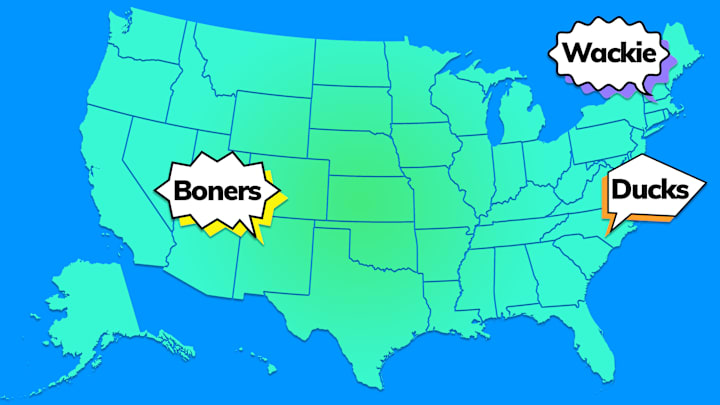Want to lay claim to that last chocolate donut? You know to say, “I’ve got dibs!” But what if someone else says, “I wackie that doughnut,” or “Let’s go snacks on it,” you might lose out on some chocolatey goodness. Be prepared by bulking up your dibs vocabulary—here are 15 ways to lay claim to something all over the United States.
- Dubs
- Ducks
- Wackie
- Aikie(s)
- Yakers
- Digsies and Halvsies
- Snacks and Snooksies
- Ballow
- Boney and Boners
- Finnie
- Hosey and Honey
Dubs
Originally a marbles term, dubs is short for doubles, which refers to winning two or more of the marbles knocked out of the ring by one shot. You’d call “dubs” on something to claim it, and use the phrase no dubs to say “hands off.” The similar-sounding dibs might be a variant on dubs, according to Dictionary of American Regional English (DARE), or perhaps an abbreviation of dibstones, a 17th-century game similar to jacks.
Ducks

This dubs spinoff might also be influenced by the marbles term ducks, which are the target marbles in the ring, according to DARE. A South Carolina resident suggested you might declare ducks on “the use of an article after the owner is through.” Someone from northwest Virginia said that while “children in the North” call “dibs” on something, children in Virginia may call “ducks on it” instead.
Wackie
This staking-a-claim Northeast term is also spelled wackers, wackies, whackie, and whacky, and is related to the English dialect word whack, which means “to divide or share.” One responder said his wife remembered hearing, “I wackies!” and “No wackies!” in New Jersey, while a Concord, Massachusetts, resident offered, “I wackie that” and “Fin whackie on my pie,” which means, “No whackie on my pie.” The saying also has a home in the lexicon of Pennsylvania and New York.
Aikie(s)
This exclamation for laying claim or equal division is from New York City, and might also be spelled akey(s) or achies. If you want to keep something all for yourself, you’d say, “No aikies!” but in Virginia you might say, “Achins!” While the origin of aikie(s) is uncertain, it might come from an English dialect pronunciation of “equal,” or hake, “to hanker or gape after.”
Yakers
“Yakers on it!” you could say of the final french fry. Whether it’s yakers, yackers, yackies, yack(s), or yakes, this Pennsylvania expression is probably a variant of aikie(s).
Digsies and Halvsies
If you want in on something someone else found first, you can call “digsies” or “halvsies.” While halvsies obviously comes from “half,” the origin of digsies is less clear. According to the Oxford English Dictionary (OED), dig is an obsolete term for a duck—and the word duck, as we mentioned above, is another way of saying “dubs” or “dibs.”
Snacks and Snooksies

To go snacks on something means “to share it equally,” at least in the South and New England. The saying is quite old; DARE’s earliest quote dates back to 1769: “They ... whipped the Magistrates Who went Snacks with them in their Plunder.” The OED’s is even earlier—it comes from the 1693 translation of The satires of Decimus Junius Juvenalis: “If one piece thou take, That must be cantled, and the Judge go snack.”
What do snacks have to do with halvsies? An early meaning of snack is “a share or portion,” according to the OED, which comes from an even earlier meaning, “a snatch or snap, especially from a dog”—perhaps with the idea of Fido snatching or snapping his share of food. A variation in the Southeast and Northeast is the phrase go snooks. Meanwhile, snooksies is used to claim first choice, as in “Snooksies on the comfy chair!”
Ballow
The eastern Massachusetts term ballow is a verb meaning “to lay claim,” as in “I ballow the last chicken wing!” The word comes from the English dialect word of the same meaning.
Boney and Boners
Want to call dibs on something in Wisconsin? You can say, “I boney it!” or “I boney-eye it!” Boners is similar, meaning “to lay claim or divide” with someone;it may also be spelled bonas, perhaps a variant of bonus. DARE’s earliest recorded usage is from 1895 in eastern Massachusetts: “I bonas it.” Those in New Mexico might say, “Let’s boners it” (presumably with a straight face). Bonas or boners probably comes from the English dialect word bunce, “a share or profit.” “Bunce!” was also used to claim possession.
Finnie
To finnie something not only means “to lay claim,” according to one DARE respondent, but to “take something that nobody seems to own.” Massachusetts and Ohio are two states where you might hear this term, which is a variant of fen, marbles lingo used as a call to give an advantage to one player or to deny it to another. Fen is a corruption of defend or fend.
Hosey and Honey
Hosey (also spelled hozey and hozy) is a way of staking claim in Massachusetts and Maine. The word might be a corruption of holds plus the diminutive -ie—in other words, holdsie—or it may be a blend of Holds I. A 1971 letter writer to the Today Show said, “Another Bostonianism which I have had to put up with over the years is the expression ‘I hosey (pronounced ‘hoe-zee’) that’ chair or what have you.” According to John Gould’s Maine Lingo: A Wicked-Good Guide to Yankee Vernacular, “Mainers generally recognize that the first to cry hoseys has established a claim.” The old-timey New York expression honey, pronounced “hoaney,” has a similar meaning to hozey.
Discover More Interesting Words:
A version of this story ran in 2017; it has been updated for 2024.
